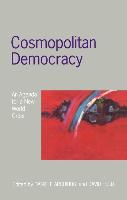The form of international regulation which dominated world politics for more than forty years has collapsed, while no alternative has yet emerged. The end of the Cold War has created new opportunities for developing an international order based upon the principles of legality and democracy. But if these opportunities are not seized, there is the danger that force will again prevail in the settings of international politics, both within Europe and beyond.
The contributors to this volume offer an analysis of the contemporary conjuncture in international politics and present an alternative model of international organization: cosmopolitan democracy. This model is based upon the recognition of the continuing significance of nation-states, while arguing for a layer of governance that would constitute a limitation on national sovereignty. The case is made for the creation of new cosmopolitan institutions which would coexist with the system of states but would override states in clearly defined spheres of activity. The term democracy in this context refers not merely to the formal construction of new democratic institutions, but also the possibility of broad civic participation in decision-making and the redistribution of power at regional and global levels.
The six essays which comprise this volume present a highly original overview of the key international issues of our times as well as a novel agenda for the extension of democracy on a transnational basis. The contributors are Norberto Bobbio, Luigi Bonanate, Mary Kaldor, David Held, Daniele Archibugi and Richard Falk.

